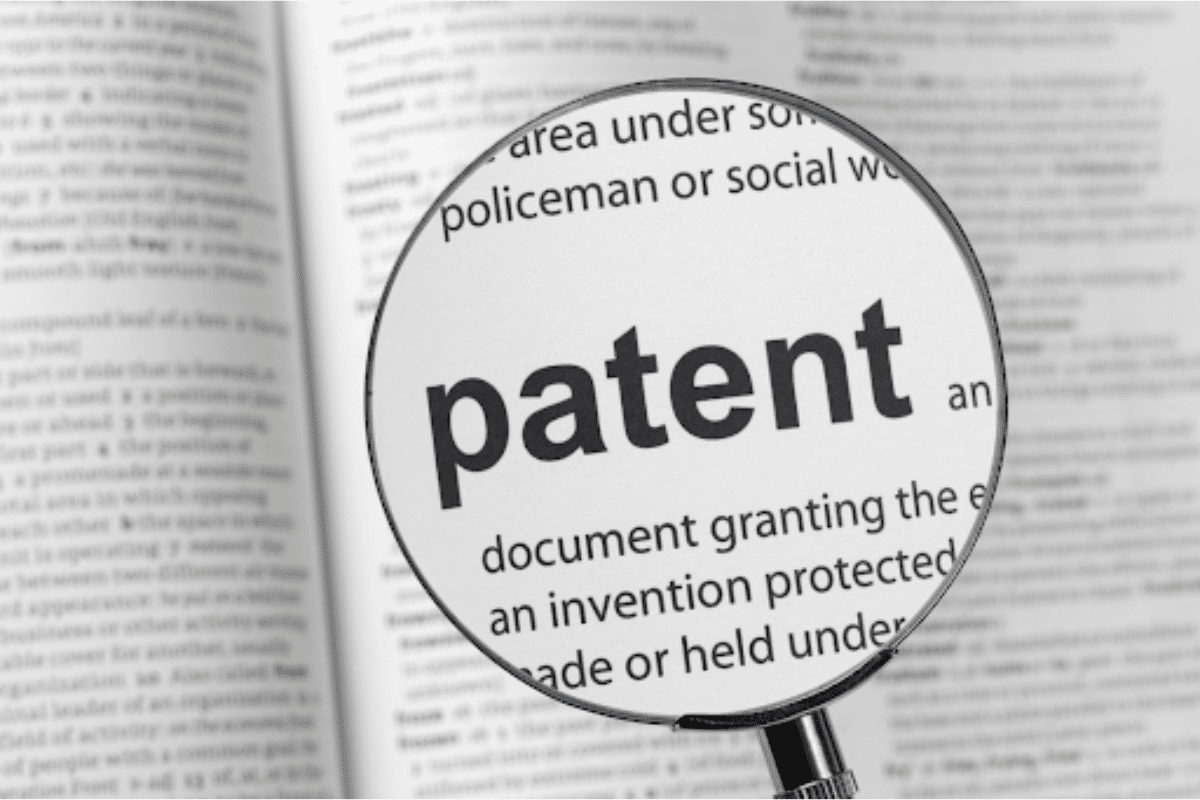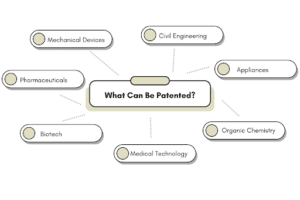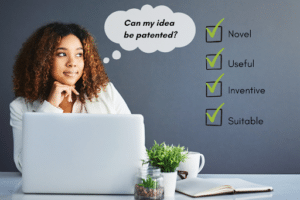- About Us
- Services
- Industries
- Resources
- Tools
- Locations
- Contact Us

If you’re a creative and inventive individual that has come up with an amazing new method, material, product or software you’ll need to take steps to protect your invention. The best way to do this is via a patent.
Understanding what can be patented in Australia and whether this is the right type of protection for your intellectual property is one of the first steps in this process.
In this guide, we will review what ideas are able to be patented in Australia and how you can apply for a valuable patent.
A patent is a form of legal protection that grants exclusive rights over an invention to the applicant. An invention can be classed as a product or process, but more specifically covers any new way of doing something.
Patents specifically protect new inventions or processes. Trademarks protect brands, logos and slogans. Copyrights cover original works of literary or artistic nature such as musical scores, poems, paintings or similar.
No, there is no legislation that requires you to patent a new invention. However, it is highly recommended you do so to protect against others profiting from your idea.
While the patent process can be arduous, it is the single best way to ensure that your product or process is protected and that you retain the rights over its use.
A patent can cover a broad range of inventions, including:
Many medical devices and diagnostic techniques are patented. Examples include pacemakers, prosthetic limbs, therapy devices, ultrasounds and surgical equipment and more.
Pharmaceutical patents usually involve protecting an active ingredient or combination of ingredients used to develop a new medication. Many vaccines are patented as well as medications used to treat cancer, arthritis, anxiety, asthma and many other common conditions.
Even Panadol was initially patented before this expired and many generic versions of paracetamol emerged.
Examples of patented biotech include monoclonal antibodies, recombinant DNA, recombinant microorganisms, chimeric antibodies and more. All of these discoveries enhance medical treatments and research.
Despite the complicated-sounding name, this category can cover everyday items such as detergents, cosmetics, plastics, food, agrichemicals, coatings and some pharmaceutical developments.
A broad category of new developments in civil engineering such as building methods, safety apparatus, prefabricated building systems, building components, power distribution methods and more.
New appliances are able to be patented but also alterations to existing appliances that enhance their usage.
For example, the idea behind a refrigerator was originally patented in 1850 in Britain, but since then there have been several new patents that build upon this idea to create new and better refrigerators.
Covering any type of new mechanical design these patents can be seen in a variety of industries from toy-making to mining, assembly lines, drones, food production and many more.
Patents may also be granted for computer-related inventions (software), biological inventions and microorganisms so long as they meet certain criteria. While there are limited circumstances in which business methods may be patented, it is possible to attempt to patent these as well.

(Image: What can be patented?)
In Australia, we do not offer design patents per se. Instead, you can apply for design rights. By registering your design rights, you protect the overall appearance and visual impression of new products.
This can cover aspects of a product such as colour, shape, texture, materials used and the ornamentation of the product itself. An example of design rights could be a clothing designer protecting a collection of prints, specific clothing cuts or similar.
Australia does not allow for the patenting of plants and their cultivars. The alternative is to apply for exclusive rights to a selective breeding process of a plant. Your plant must be new or recently discovered and distinct. Uniformity and stability of the breeding process must also be demonstrated.
Plant breeder's rights last for up to 25 years depending on the plant, tree or vine species.
As your idea is new, it’s not like you can simply Google it to find out if it is acceptable to be patented.
So how do you check? You need to review your invention in line with some set criteria regarding what can be patented. Namely, it needs to be:
Novel - this means it must be a new idea that has not been disclosed to the public previously.
Useful - it should be something that can be made or used in a specific industry.
Inventive - Not only should it be a new idea, but it must also be different to what already exists in a way that is not obvious.
Suitable - Known as the ‘manner of manufacture’, it must belong to the useful arts and provide a material advantage to the economy.

(Image: Can my idea be patented?)
Even though some things can be classed as new or inventive, not all of these are able to be patented.
Why? There can be several reasons why certain inventions will be denied a patent including any that are seen to put the user at risk, those that have a criminal purpose, and those that violate scientific laws. It could also be that the idea is too abstract and unable to be quantified in a way that meets patent criteria.
Examples of things that cannot be patented include:
While mathematical formulas or natural substances are not permitted to be patented there are some possible workarounds. Should you find a new way in which to apply the formula to improve a process or develop a new cosmetic including the natural substance you may still have grounds to apply for a patent.
Every nation globally manages its patent process differently. While there can be some overall similarities you will need to review the specifics of what is permissible in each location individually to determine if you have grounds to apply for a patent.
Keep in mind that patents are territorial rights, meaning they are only valid in the country they are issued in and will not protect your rights overseas. Additionally, just because your patent was approved here, doesn’t mean it will be overseas should you pursue further protection internationally.
Undecided whether you should apply for a patent or whether your invention can be patented? No idea where to begin? The team at IP Guardian can help.
As highly qualified patent and trademark attorneys, we have decades of experience pursuing successful patent applications for our clients.
We perform all the appropriate checks to determine whether your invention can be patented as well as doing all the necessary checks to ensure an existing patent for the same invention is not already in place.
We are passionate about supporting Australians to protect their inventions and with our commitment to delivering cost-effective services, professional support is accessible for businesses of all sizes.
With our expert guidance, the process of acquiring a patent is seamless and stress-free. To learn more or start your patent application, contact our friendly team today at (02) 9071 0130.

Registered Patent and Trade Mark Attorney with significant experience obtaining all forms of registered intellectual property. I hold a Bachelor of Science in Engineering, a Masters of Business Administration and a Masters of Intellectual Property. I’m passionate about showing my clients how they can protect their brands through trademark registrations.
I found them online and initially I was bit hesitant to talk to them about my problem but when I spoke to Barry, I felt more comfortable, and he gave me all the information and advice I wanted without even thinking that I am going to give him business or not. Finally, I went with them, and they made the entire process so smooth and easy for me. john was keeping us updated with each step he was doing. I would recommend these guys for any patent or trademark related service.
I would like to express my thanks to Barry and his team at IP Guardian in Sydney for their assistance with our recent Trademark application. Barry was highly professional, readily available throughout the process and clearly communicated expectations. Barry even helped us refine our application so that we had a greater chance of success which was very much appreciated to avoid extra costs. I would highly recommend Ip Guardian for all your Trademark and Intellectual Property needs.
Barry, last week, you and your professional team, made my year (or probably my next 21 years). So thank you so much for your executive, calm yet very effective actions under extream pressure. Elias Hajjar, Director, TROLLEYON PTY LTD
Informative, understood the business, what it needed and answered questions in a friendly and approachable manner. Easy decision to continue working with IPGuardian for future trademarking
From the day I contacted Barry Meskin until now with my silly amateur questions, he has been nothing short of amazing. I actually NEVER leave reviews anywhere, but I felt the need to do so for Barry and his team. I myself am a tradie, so I felt intimidated speaking to an attorney. But the second I spoke to him on the phone, he made me feel right at home. Never pressured me into any decisions, yet when I decided to go ahead with him, he delivered what I needed much quicker than what I was expecting. I cannot speak highly enough of him and recommend his services 100%.
The team at IP Guardian have made the process extremely straight forward and easy for us to understand exactly what was required. I will highly recommend to our clients who need help with IP.
I have dealt with Barry over the years, his advice and experience has helped me greatly. Looking for to working with him and his team again. Maher.
IP Guardian helps protect words, symbols, letters, numbers, names, signatures, phrases, sounds, shapes and smells. Yes, I said smells.
We've had the pleasure to work closely with Barry for many years. He has been exceptional to deal with and has a keen focus in providing a commercial led IP "go to market" strategy for start-ups and well known brands. Makes it easy and always advises on different ways to navigate through the IP process.
Barry Meskin @ IP Guardian is an experienced and extremely knowledgeable expert in the domain of intellectual property, patents and trademarks. In addition he has been extremely responsive and very professional in all our dealings. I wholeheartedly recommend Barry's services to any business or anyone seeking advice in this area - great quality and great value.